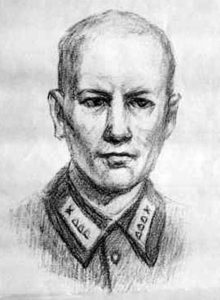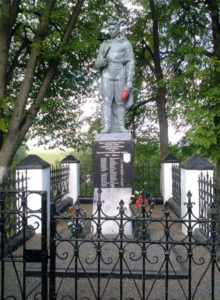
He was born in 1921, in Oryol town. On 22nd of June 1941 he was wounded in the air raid. The wound was light so in a few days he was sent to the front – to the town of Krichev, as a cannon gunner in the staff of the 55th rifle regiment of the 6th infantry division. On 17th of July 1941 his rifle regiment was retreating. “Two people gonna stay here with a cannon,” – said the commander of the battery. Nikolay volunteered. The second man was the commander himself.
Sirotinin settled on a hill, in the thick rye. From that location a road, a river and a bridge could be watched very clearly. When at dawn the German tanks came in sight, Nikolay blasted the leading machine and that one closed the file and by that means he arranged the traffic congestion. Thereby the task was accomplished, the tank column was retarded. Sirotinin could go to his regiment, but he remained – as he still had about 60 shells left.
Two tanks tried to pull the leading tank off the bridge, but were put out of action too. Armoured vehicle tried to cross the river Dobrost not over the bridge. But it stuck in muddy bank, where it was found by the next shell. Nikolay shot and shot, destroying tanks one after the other. The Germans had to fire at random as they could not locate his position. In two and a half hours Nikolay Sirotinin fought off all the enemy’s attacks, destroyed 11 tanks, 7 armoured vehicles, 57 soldiers and officers.
Fascist tanks bumped into Nikolay Sirotinin like into Brest fortress. 11 tanks and 7 armoured vehicles were already burning. The fact that more than a half of them were burnt down by Nikolay Sirotinin alone was doubtless (artillery located on the other bank of the river managed to fire some of them too)
During nearly two hours of that strange battle the Germans could not realize where the Russian battery entrenched. And when they moved into Nikolay’s position, they were very amazed that there was only one gun. Sirotinin had only three shells left.
They ordered to surrender. And he answered with rifle firing against them.
Ober-lieutenant of 4th tank division Hendelf wrote down in his diary, “17th of July 1941. Sokolnichy, near Krichev. Last night we buried Russian Unknown Soldier. He was alone at the gun, shot colony of tanks and infantry for a long time and was killed. Everybody was surprised by his courage… Oberst (Colonel) – German officer said over the grave that if all the Fuhrer’s soldiers fought like this Russian man we could conquer the whole world. They fired volleys three times. Still he’s Russian, is there a need for such worship?”
In the afternoon the Germans gathered at that place where the cannon stood. They forced the local residents to come there too, – recalls Verzhbitskaya, – Chief German with decorations ordered me to translate, as I could speak German. He said a soldier has to defend his Motherland in such way only. Then they took the medallion with a note out of the pocket of soldier’s blouse of our killed soldier where it was written who he is and where he comes from. Chief German said to me: “Take it and write to relatives. Let mother know, what a hero her son was and how he fell in the battle”. I did not dare to do it…Then a young German officer who had stood on the bottom of the grave and covered Sirotinin’s body with Soviet waterproof-cape pulled out of my hand a bit of paper and the medallion and said something rudely.

The Hitlerites stood still by the cannon and the grave in the middle of the collective farm field after the burial for a long time and counted shots and hits with admiration.
In 1961 the monument was erected on the place of exploits. There is Sirotinin Street in Krichev town.
The fact that the hero was buried by enemies with honors says a lot. Being aware that he went to his death, he still volunteered.
In Russia there were a lot of people in the difficult times of any wars who sacrificed their lives for the sake of the nation.